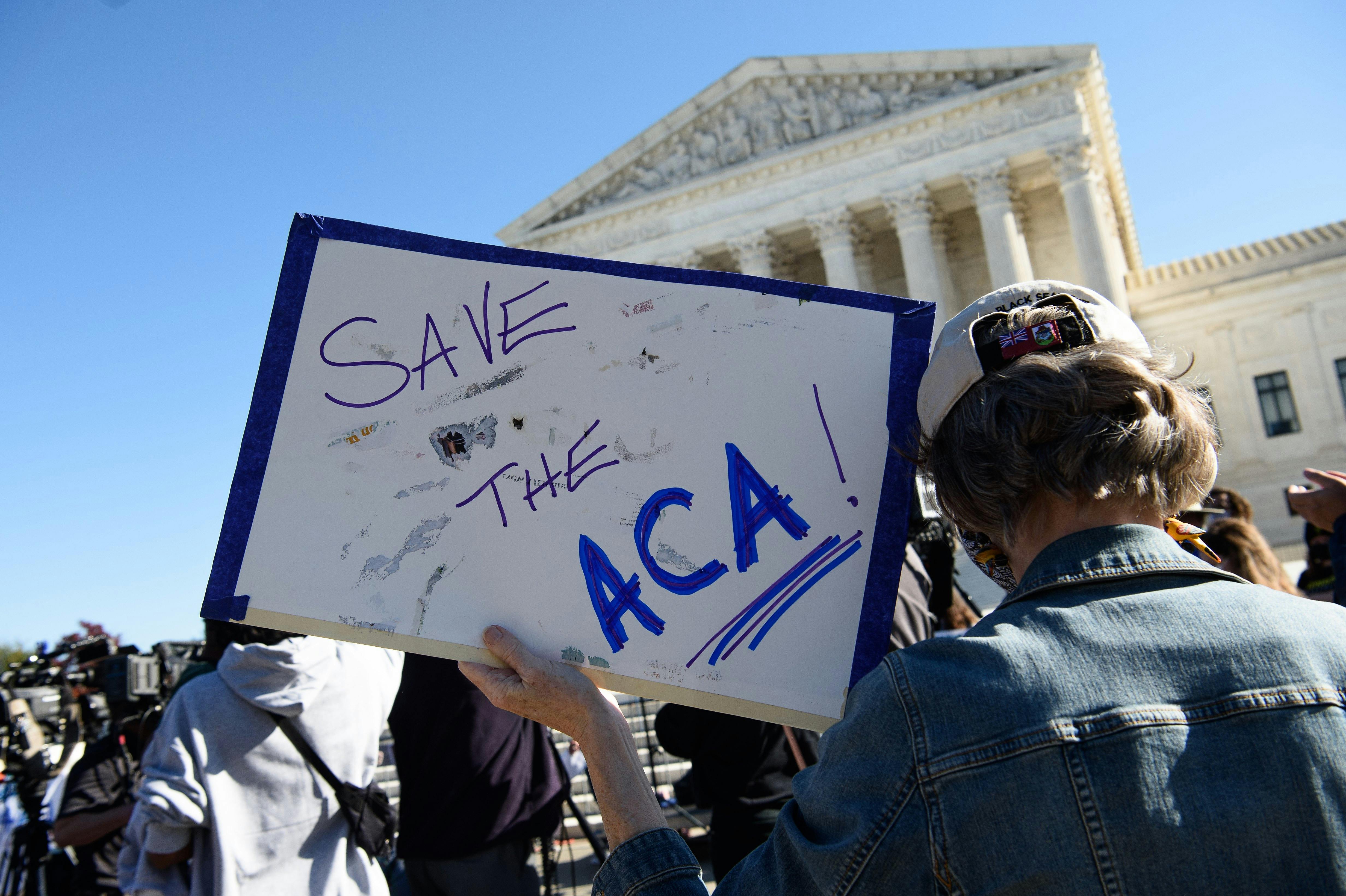The Supreme Court Could Reignite An Hiv Crisis

What’s past is prologue: In 1987, Republican Senator Jesse Helms took to the Senate floor to defend an amendment to the appropriations bill that blocked funding for HIV programs that “promote, encourage, or condone homosexual activities.” That amendment passed 96–2 in the Senate and passed the House with only 47 objections.
Helms’s ire was aimed directly at programs like New York City’s Gay Men’s Health Crisis, which had distributed materials promoting safe sex as the AIDS epidemic ravaged its community. Writing in an op-ed for The New York Times, New York Mayor Edward Koch argued that Helms’s aims were not only heartless but also counterproductive. “Cutting off Federal funds to organizations like Gay Men’s Health Crisis may only spread the disease,” he wrote, “causing the deaths of not only homosexuals but heterosexuals of both sexes and, most tragic of all, innocent infants.”
It is impossible to count just how many people of all backgrounds died from HIV as a result of Helms and the moral cowardice of 95 of his fellow senators, but now it appears the next Congress might get a chance to follow in Helms’s footsteps under Trump 2.0.
On Friday, the Supreme Court decided to hear a case, Braidwood Mgmt., Inc. v. Becerra, that will decide the constitutionality of the preventable care requirements of the Affordable Care Act, or ACA. Under the ACA, health insurers are obligated to cover preventative health services at no cost to the patient. This includes everything from vaccines against deadly viruses to breast and cervical cancer screenings, to statins for heart disease. It also notably includes HIV prevention under that umbrella—and for good reason. Not only is it the humane thing to do, it also saves health insurers a lot of money. Just as it’s far cheaper to conduct a pap smear and catch cervical cancer in its early stages than it is to provide end-of-life care for those about to succumb to the disease, so too does preventative care lessen the burden of HIV on patients, doctors, and insurers.
This particular lawsuit originated in Texas, where a handful of Christian businessowners objected to providing the HIV prevention drug regimen known as PrEP to their employees. One of the employers is represented by the Stephen Miller–led legal group America First Legal, which argued that the requirement “promotes homosexual behavior” and therefore violates its client’s “religious beliefs by making him complicit in encouraging those behaviors.” In his ruling, a Trump-appointed federal judge specifically carved out HIV prevention as a violation of the employers’ constitutional rights, writing that the PrEP mandate “substantially burdens [their] religious exercise.”
The case then went to the conservative-leaning Fifth U.S. Circuit Court of Appeals, which ruled the requirement is unconstitutional because the U.S. Preventative Services Task Force, or USPSTF, which decides what preventative care services should be covered under the ACA, is not appointed by the president and approved by Congress. Put differently, the Fifth Circuit is upset that basic medical decisions are decided by an independent volunteer panel of national experts in disease prevention and evidence-based medicine, and not by a group of appointees with a political agenda.
For now, the Fifth Circuit’s ruling only applies to the Texas businessowners who have won the right to deny HIV care to their employees. But if SCOTUS rules in the Christian employers’ favor, Trump will appoint members to the USPSTF, and the Republican-majority Congress will then be allowed to confirm his choices.
The fallout of this decision would not only impact those at high risk of contracting HIV. With public health potentially falling under the auspices of noted vaccine-cynic RFK Jr., parents with immune-compromised children will have another reason to worry that their child’s classmates aren’t up to date with their vaccines. A woo-woo “wellness”-obsessed Department of Health and Human Services secretary could also decide that mental illnesses, such as anxiety and depression, are best treated with meditation and the like, and cut mental and behavioral health services from the preventative care requirement. But the fallout from this change in command may fall most cruelly on those who live with HIV, who have benefited from considerable medical advancement since the bad old days of Jesse Helms.
When taken as prescribed, PrEP is 99 percent effective at reducing HIV transmission. Currently, there are 1.2 million Americans living with HIV; the good news is that according to the Centers for Disease Control and Prevention, HIV transmission in the U.S. decreased by 12 percent between 2018 and 2022. This is in no small part due to the ACA’s preventative care requirements to cover the medication in full. But despite these small successes, PrEP uptake is still largely uneven. A 2024 study found much higher usage in liberal states, especially when compared with states in the Deep South. Uptake in New York was estimated at around 22 percent, compared to just 4 percent in West Virginia. Without the preventative care requirement, the gaps could further widen as millions of Americans would not be able to afford the roughly $2,000 per month to protect themselves against infection.
But patients at risk of HIV are hardly the only ones who could be affected by a negative SCOTUS ruling. Research from the Health Care Cost Institute estimates that without the ACA’s preventative care requirements, basic health care services could become unaffordable for millions of Americans. When spread across all insurance enrollees, the cost of a colonoscopy runs around $11, and $24 for a mammography. If individuals had to pay for these services, the costs could jump to $1,444 and $255, respectively. Things like cholesterol tests, which are currently fully covered by insurance, would cost $15. That might not sound like a lot, but for somebody living on the poverty line, for whom that money represents two gallons of gas to get to work, $15 could be the difference between an extra decade of life and a heart attack.
With climate change potentially causing a host of new deadly viruses, there is no telling what preventative care measures will be needed in the following decades. It is equally hard to predict what new trends in public health might arise in the next century that will provoke the condemnation of a new right-wing movement, which now wants to subject long-settled matters, such as the efficacy of the polio vaccine, to a renewed “debate.” HIV provided the perfect opportunity for politicians like Jesse Helms to further marginalize an already vulnerable population. “We’ve got to call a spade a spade,” he said to his fellow senators, “and a perverted human being a perverted human being.” With a new administration openly beating their chests about transforming the federal government into an engine of retribution against disfavored groups, it’s simultaneously frightening to think how little has changed since the late 1980s, and how much could—very quickly—change again.


